The GLP aggregated and excerpted this blog/article to reflect the diversity of news, opinion and analysis.
Monsanto Co. plans to make its operations carbon neutral by 2021, in part by working with farmers who use its products to help them reduce carbon emissions.
To be carbon neutral, Monsanto must reduce its net emission of climate-changing carbon to zero. Climate change is one of the most vital issues facing humanity, Monsanto’s Hugh Grant said in an interview, and an “untold story” is the agricultural industry’s effort to address the issue.
Grant said part of St. Louis-based Monsanto’s effort is basic “good housekeeping,” such as stricter emissions control, conserving energy at offices, using more fuel-efficient vehicles. The company also pledges within its seed production operations to reduce its carbon footprint through breeding, plant biotechnology, conservation tillage and use of cover crops.
A key component of the plan calls for working with the thousands of farmers who use Monsanto seeds and pesticides. The company is developing an incentives program to encourage environmentally friendly production methods — cover crops and conservation tillage chief among them — that allow the soil to absorb and hold as much or more greenhouse gases than are emitted in corn and soybean farming.
David Lobell, deputy director of the Center on Food Security and the Environment at Stanford University, said it is important for any major company to strive for carbon neutrality.
“Even if it doesn’t make much of a dent by itself, it certainly is a positive step,” Lobell said.
Read full, original post: Monsanto Pledges to Be Carbon Neutral by 2021































